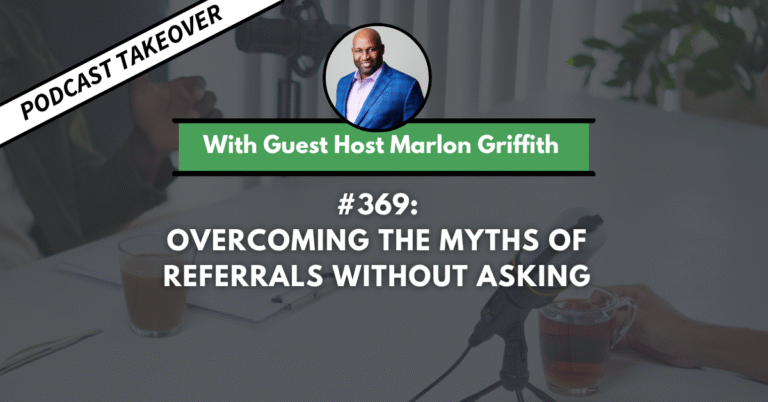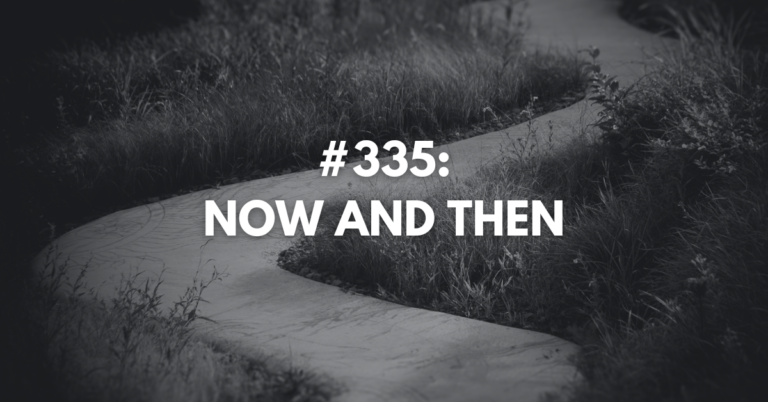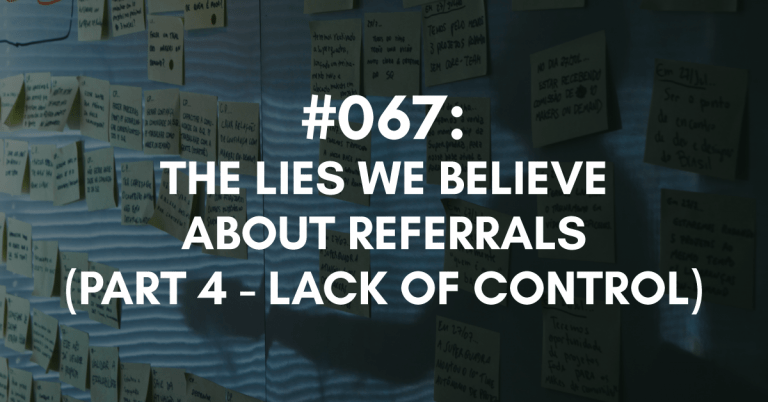Ep #324: Debunking Referral Surveys
Have you ever heard the statistic that 91% of customers say they would give referrals, but only 11% of salespeople ask for them?
While this data suggests a discrepancy between client willingness to refer and salespeople’s efforts to ask for referrals, it overlooks the larger context of how referrals actually occur.
A study from 2022 found that 78% of clients who referred their financial advisor did so because they were asked by a family member or friend for a recommendation, not because the advisor asked them directly.
This challenges the idea that referrals are primarily a result of salespeople asking for them and instead underscores the importance of client relationships and word-of-mouth recommendations.
To truly understand how referrals come about, we need to ask deeper questions about whether clients refer their advisor and the circumstances in which referrals are made.
Focusing on genuine connections with your clients by building trust and loyalty can help create a network of satisfied customers who are more likely to refer your services. Ultimately, referrals come from client relationships built on trust, communication, and mutual respect.
By understanding the true motivations behind referrals, you can build a referable business based on genuine relationships and client needs rather than solely relying on asking for referrals.
Links Mentioned During the Episode:
Read more about referral surveys in this article.
Want to work with me so I can help you 2x, 3x, 4x your referrals over last year? Then apply to work with me inside my coaching program, Building a Referable Business. Please submit your application now.
Want to check out our brand new “Starter Course”? It’ll be the best $500 you spend to get Your Next 5 Referrals.
Want me to build your Referral Strategy for you? Then check out my VIP Referrals In A Day service where I handle the heavy lifting for you. First step is to apply to see if you’re a fit and then we’ll schedule a call. (*A minimum of a 2-person team is required for this Done-For-You service.)
Next Episode:
Next episode is #325, which is another episode created with you and your needs in mind.
Download The Full Episode Transcript
Read the Transcript Below:
Stacey Brown Randall: Ever heard the stat, 91% of customers say they’d give referrals, but only 11% of salespeople ask for referrals? Yeah, me too. I’ve heard that one, and it’s not what you think. So let’s talk about it.
Hey there, and welcome to episode 324 of the Roadmap to Referrals podcast, a show that proves you can generate referrals without asking or manipulation. I’m your host, Stacey Brown Randall. My journey from a business failure to a successful business now almost 11 years in, I know generating referrals naturally and consistently has made all the difference. Working with clients around the world, we leverage the science of referrals, protect relationships above all else, and help you build a referral business.
From time to time, I’ll hear people talk about survey results that seem to prove that they should be asking for referrals. There are articles written about it. There’s postings on LinkedIn about it. Maybe there’s even data referenced in trainings or publications. I mean, I know that people see these survey results all over the place.
Well, there’s a big assumption being made within that survey, and I want to break it down for you. Now, I am not associated with anyone who runs these surveys and I’m not actually even talking about one survey in particular.
In my line of work, I see information like the statistics that come out of survey results, but I’m just a consumer of the information like you. I’m not behind the scenes. I don’t know exactly everything that is going into these surveys or what they’re trying to gain from these surveys, like what the objective is of the surveys. I’m on the outside looking in just like you guys.
But I wanna share my thoughts as to what I think is missing or at least being overlooked when I see survey data like this come out. Okay, here we go.
I typically, more than likely, see this type of survey done within the financial services industry, like financial planners or advisors, maybe wealth managers, and a lot of times within the sales professional industry.
And it is the type of survey that is saying that it’s asking clients about lots of different things. But one thing they’re asking about is referrals. And would you prefer your financial advisor? Would you prefer this person? Whatever the industry is that’s ultimately doing this survey.
And so it typically will ask the client, hey, would you refer your financial advisor? I’ll just use that as my example. So the survey typically asks, amongst a lot of questions that it’s asking, right? This is never just probably the way that I’ve seen it at least, the one question that’s being asked.
The survey typically asks the client, right, that’s who’s being sent the survey, would they refer their financial advisor? And then the counterpart survey to the financial advisor is also asking the financial advisor, do you ask for referrals?
And the results they get is, 91% of customers say they give referrals. Yes, I would give referrals. And only 11% of those financial advisors, though, are asking for the referrals.
The assumption that is then made is because around 90% of people say that they will refer, the issue of referrals not being given or not being made by clients must be because those advisors aren’t asking. There’s only 11% that say they are asking. And that’s why there’s such a discrepancy, right?
So the assumption being, hey, 90 plus percent of clients, of customers say that they would give referrals. But referrals aren’t being made, and so we’re making the assumption then that that’s because the advisors aren’t asking. Because when we ask the advisors, hey, are you asking for referrals? Only 11% are.
So if 90% say they’ll refer them, and only 11% are actually asking for them, the reason why referrals aren’t happening is because the advisors aren’t asking. That is typically what is presented within that data of a survey that I see.
But here’s the thing, that is not the full story. Here’s where you have to pay attention to the questions being asked and how they are being asked.
Typically, the question being asked to the clients is, would you refer your financial advisor if asked? And it’s the only question on the survey about referrals.
It’s kind of like that feeling, maybe you get this, maybe you don’t, but it’s kind of like that feeling you may get when answering questions on a personality assessment and you feel like you’re helping the assessment put you into a box, right? I just, how a question is asked matters.
In this case, I feel additional questions would really probably suss out the reality of those statistics and provide a much-needed backstory. Like, oh, so much. So like, here’s what I mean.
Stacey Brown Randall: Hey there, pardon the interruption. If you’re a longtime listener of this podcast, then you’ve heard me mention my Building a Referable Business Coaching Program. But did you know the coaching program is only one of the three ways I work with clients?
You can dip your toe in and get started with my starter course called Your Next Five Referrals. Or if you have a small team and you want me to build your strategy for you, well, my VIP program is right for you.
Link to all three ways to work with me, Your Next Five Referrals online program, the BRB coaching program, and the VIP experience are in the show notes page for this episode. Now, back to the episode.
Stacey Brown Randall: Okay, so here’s what I mean when I talk about how questions are asked matters, and additional questions would really get to the reality of the statistic.
So typically, the question being asked is, would you refer your financial advisor if asked? And they’re saying, yes, of course I would refer my financial advisor if asked. But in addition to just asking, would you refer your advisor, how about we also ask, do you refer your advisor?
Because saying that you will refer them is like saying, I’ll get back to you. And in reality, we don’t. So the question asks, would you refer? And that’s great. That’s like future intention that maybe I will.
And in the moment, I’m going to say the right thing. And I think people taking the survey, they feel like in the moment, the right thing to say is if they like and appreciate working with their financial advisor and the right thing to say in that moment is, well, yes, of course I would refer them if they asked me.
But the follow-up question needs to be, well, do you actually refer your advisor? And then I think there even needs to be one further question that goes deeper that asks, if you do refer your advisor, what were the circumstances in which you referred them?
And I think that question is asked which is really hard to get answers to, like in a yes or no, and I get that, right? But this would provide context into what was happening and what prompted the referral to be made, which I know would show that when referrals are being made, it isn’t because the advisor asked, but because an opportunity came up with someone they know who needed an advisor.
Let’s be honest, we sometimes make a selection on a survey because, well, they’re the only available choices. But I believe that rarely tells the whole story. It’s like a snapshot for a moment in time or me saying that I would do something because it feels like the right thing to say, yes, I would do. But in reality, I’ve never actually done it. right?
Just because your client says they will refer does not mean they actually will do it and will follow through. There was a study that was done in 2022 that proves this.
Seventy eight percent of clients asked if they referred their advisor, like, why did they do it? So 78% of clients who had referred their advisor were asked the situation in which they referred their advisors.
And 78% of those clients said they did so because they were asked by a family member or a friend for a financial advisor recommendation or they provided a recommendation, a referral, to their financial advisor when a family member or friend mentioned a financial problem they were having.
Seventy eight percent! Like, that’s a huge amount, right?
So I just want you to kind of think through when you see survey results out there and they’re talking about generating referrals and they’re talking about what you need to be doing as the business owner, as the service provider, as the person trying to get the referrals.
And they say, hey, your clients say they will refer you, but you’re not asking, so that’s why you’re not getting them. Please know that’s not the whole story. There’s a huge gap there in terms of what’s actually really, really happening.
Because that study done in 2022, I know this is highly in the financial advising space, but I think it is relevant for lots of different industries. Remember that 78% of clients that ended up referring their advisor did not do it because their advisor asked them.
Seventy eight percent of clients ended up referring their advisor because they were asked by a family member to refer them or they were talking to a family member or friend, right, both. And that friend or family member mentioned that they were having a financial problem. And they stepped in and said, hey, I have someone I want you to talk to.
And this survey from Absolute Engagement, I think, really boils it all down to made this statement that is so very true, and I quote, “The key point is that while clients do give referrals, they often do so when friends and family, and not usually their advisor, are the ones who ask for them”. End quote.
I think it’s so very important that we pay attention to the information that is out there. There’s a lot of bad information. There’s a lot of noise. There’s a lot of junk. Information is out there. I see people who have success doing one thing and then they’re like, oh, this must work for everybody. And it doesn’t.
I think the same thing when I started my business. When I generated 112 referrals my first year as a productivity and business coach, I had no idea that it was going to work for other people. And I certainly didn’t make the assumption that it would.
But I had two clients in particular that were saying, hey, I want to learn your referral stuff, which forced me to figure out my strategies and what I was doing and how it worked and all the things, right? And then I did it to them. One was a financial advisor, and one was an attorney. And from there, it grew.
And I started teaching my strategies to other people who wanted to learn it. So obviously, now I’m working with CPAs and bookkeepers and real estate agents and interior designers. And so that kind of grows and grows and grows in terms of where I’m seeing success.
But in the very beginning, it worked for me. And when my client said, I’m going to pay you to coach me on what you’re doing, and I want to see if it works for me, that’s when I learned, oh, right, this works for other people. It has nothing to do with being a coach and nothing to do with Stacey’s personality, my personality, and nothing to do with who I am, that this would work across the board.
And I think there’s a lot of people out there who have success in one thing and build a business around it. And they make projections that it’ll work for others, when necessarily they haven’t seen that yet. They just see it maybe hopefully working for themselves.
I’m not saying you can’t build a business foundation on that. That’s how I started. But I didn’t claim it was going to work for other people until it actually started working for other people.
And this goes into that survey data that I see a lot too. Like there’s just a lot of junk out there. And there’s a lot of stuff that says you need to be asking, you should be asking, and here’s some results to prove it.
And all I’m encouraging you to do with this episode is ask more questions. Dig in deeper. If you see results that say you need to ask for referrals, and here’s all the clients that would give them, here’s the percentage of clients that say they would give referrals if they were asked for them.
Ask the question, well, did you actually go back and ask if those clients do ultimately refer? Like, are they giving referrals to the service providers that they’re working with? And what were the circumstances in which that referral actually happened? Because I can guarantee you it isn’t. because you were asking your clients to refer you.
I know that’s not when they’re referring you and if they do it’s usually going to happen once or twice but that’s not going to build consistency and sustainability because that’s not what the science and the data and the research and my 11 years of being in business ultimately shows.
So I hope you enjoyed this little soapbox episode. I wanted to keep it short and sweet because I knew I was gonna be on my soapbox, but if you’d like to find the show notes page for this episode, it can be found at staceybrownrandall.com/324. That’s three, two, four.
And we’re back with another great episode next week created with you and your needs in mind. Until then, you know what to do, my friend. Take control of your referrals and build a referable business. Bye for now.







